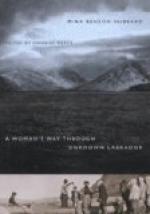“Would an otter really harm me?” I asked.
“Perhaps it might be a bear instead of an otter,” he replied, evading my question. “They are all great fellows for any kind of metal. If it’s a bear he’ll just get hold of that screw on your bed and take it right off. You’d better put a bullet inside, and then when he takes off the screw it will blow into his mouth. He’ll think a fly flew down his throat, and cough. Then you could run.” George’s eyes were dancing with amusement at his own pictures. Presently he went on: “I think—oh! you keep a rifle in there though, don’t you?”
“Yes.”
“Don’t you think you could handle salt a little better than a rifle?”
This was insulting; but I was laughing too heartily to be properly indignant, and he continued: “You might put a little salt on his tail. Maybe you could put that otter out of business, too, if you had enough salt.”
A duck flew past, dropping into the water a little way above our camp, and George sprang for a rifle. He shot, but missed, which I assured him was only proper punishment for the slighting insinuations he had made in regard to my shooting. Job, and Joe went fishing after supper but got nothing. It was a fine evening with a glorious sunset, beautiful evening sky, and a splendid moon. George said: “Fine day and fine breeze to-morrow.”
My sleep was not disturbed that night by either bear or otter, and we were up and started on our way the next morning at 7.30. A rough portage of three-quarters of a mile was completed some time before noon, and beyond this the canoes were kept in the water most of the day. At lunch Gilbert brought me a dandelion. I was greatly pleased to get it, and later I saw several of them. I found also blue and white violets, one of the blue ones a variety I had never seen before.
Towards evening the hills had melted away. We had come up to the top of those which, twenty miles back, had looked high, and now we could look back and down to those which there had also seemed high. A new thrill came with this being up among the hilltops, and I began to feel like an explorer.
The tents were pitched near a pool of smooth water, deep and darkened by shadows of the evergreens on either shore. On the farther side of the river were low, wooded hills, and opposite our camp a brook came tumbling through the wall of evergreens into the river. Just above the brook a high, dead stub, with a big blaze on it, showed where we were to leave the Wapustan to cross to Seal Lake.
It was not until noon on Saturday, July 15th, that we left our pretty camp, for it rained steadily in the meantime. Then we started on our cross-country trip, working up to the north, from which direction the brook flows. A two-mile carry brought us out on Saturday evening to a lake at its head. After dinner on Sunday we again went forward with a whole mile of paddling to cheer us on our way. From the head of the lake another mile of good portaging brought us at last to waters flowing to Seal Lake, and we were again in the canoes to taste for a little the pleasures of going with the tide. For long we had been going against it—and such a tide!




